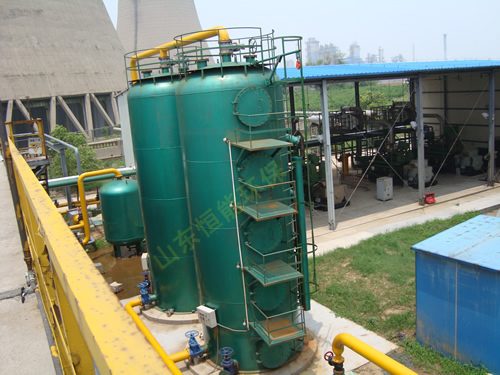歡迎進入betway开户网站
歡迎進入betway开户网站
沼氣脫硫塔的工作原理解析
 首頁- betway体育入口 > 公司新聞
首頁- betway体育入口 > 公司新聞
 2025-07-22
2025-07-22
沼氣作為(wei) 一種清潔的可再生能源,在生產(chan) 與(yu) 使用過程中,其中含有的硫化氫是主要汙染物,不僅(jin) 會(hui) 腐蝕設備,燃燒後還會(hui) 生成二氧化硫汙染環境。沼氣脫硫塔作為(wei) 去除硫化氫的關(guan) 鍵設備,其工作原理基於(yu) 化學吸收或物理吸附作用,通過一係列工藝過程將硫化氫從(cong) 沼氣中分離,保障沼氣的安全利用與(yu) 環保排放。
Biogas, as a clean and renewable energy source, contains hydrogen sulfide as the main pollutant during production and use. It not only corrodes equipment but also generates sulfur dioxide after combustion, polluting the environment. As a key equipment for removing hydrogen sulfide, the biogas desulfurization tower works based on chemical absorption or physical adsorption. Through a series of process steps, hydrogen sulfide is separated from biogas, ensuring the safe utilization and environmentally friendly discharge of biogas.
沼氣脫硫塔的核心功能是利用脫硫劑與(yu) 硫化氫的化學反應實現淨化。常見的脫硫工藝可分為(wei) 幹法脫硫與(yu) 濕法脫硫,兩(liang) 種方式的工作原理各有側(ce) 重,但均以硫化氫的轉化與(yu) 分離為(wei) 核心。幹法脫硫中,脫硫塔內(nei) 填充固體(ti) 脫硫劑(如氧化鐵、活性炭),當含硫化氫的沼氣通過脫硫劑層時,硫化氫與(yu) 脫硫劑發生化學反應,生成穩定的硫化物。以氧化鐵脫硫為(wei) 例,氧化鐵與(yu) 硫化氫在常溫下反應,生成硫化亞(ya) 鐵和水,反應式為(wei) Fe₂O₃ + 3H₂S = 2FeS + 3H₂O,通過這一反應,硫化氫被固定在脫硫劑中,淨化後的沼氣從(cong) 塔頂排出,硫化氫濃度可降至 50ppm 以下。
The core function of a biogas desulfurization tower is to achieve purification through the chemical reaction between desulfurizer and hydrogen sulfide. The common desulfurization processes can be divided into dry desulfurization and wet desulfurization, each with its own emphasis on the working principle, but both focus on the conversion and separation of hydrogen sulfide. In dry desulfurization, solid desulfurizers (such as iron oxide and activated carbon) are filled in the desulfurization tower. When the biogas containing hydrogen sulfide passes through the desulfurizer layer, the hydrogen sulfide reacts chemically with the desulfurizer to generate stable sulfides. Taking iron oxide desulfurization as an example, iron oxide reacts with hydrogen sulfide at room temperature to produce ferrous sulfide and water. The reaction equation is Fe₂O₃ + 3H₂S = 2FeS + 3H₂O, Through this reaction, hydrogen sulfide is fixed in the desulfurizer, and the purified biogas is discharged from the top of the tower, reducing the concentration of hydrogen sulfide to below 50ppm.
濕法脫硫則通過液體(ti) 吸收劑與(yu) 硫化氫的反應實現淨化,更適用於(yu) 處理硫化氫濃度較高的沼氣。塔內(nei) 的吸收劑(如氨水、碳酸鈉溶液)通過噴淋裝置均勻分布,與(yu) 上升的沼氣充分接觸,硫化氫溶於(yu) 吸收液並發生化學反應。例如,碳酸鈉溶液吸收硫化氫時,會(hui) 生成碳酸氫鈉和硫氫化鈉,反應式為(wei) Na₂CO₃ + H₂S = NaHCO₃ + NaHS,吸收了硫化氫的富液進入再生係統,通過曝氣或加熱使硫化氫解析出來,再生後的吸收劑可循環使用。濕法脫硫的優(you) 勢在於(yu) 可連續運行,適合大規模沼氣工程,如垃圾填埋場、大型養(yang) 殖場的沼氣處理,能將硫化氫濃度從(cong) 數千 ppm 降至 100ppm 以內(nei) 。
Wet desulfurization achieves purification through the reaction between liquid absorbent and hydrogen sulfide, and is more suitable for treating biogas with high hydrogen sulfide concentration. The absorbent (such as ammonia water and sodium carbonate solution) inside the tower is evenly distributed through a spray device and fully contacts with the rising biogas. Hydrogen sulfide dissolves in the absorbent solution and undergoes a chemical reaction. For example, when sodium carbonate solution absorbs hydrogen sulfide, it produces sodium bicarbonate and sodium hydrosulfide, with the reaction formula Na₂CO₃ + H₂S = NaHCO₃ + NaHS, The rich solution that has absorbed hydrogen sulfide enters the regeneration system, and the hydrogen sulfide is decomposed through aeration or heating. The regenerated absorbent can be recycled. The advantage of wet desulfurization is that it can operate continuously and is suitable for large-scale biogas projects, such as landfill sites and large-scale livestock farms. It can reduce the concentration of hydrogen sulfide from thousands of ppm to less than 100ppm.

脫硫塔的結構設計為(wei) 反應提供了高效的接觸條件。塔體(ti) 通常采用圓柱形結構,內(nei) 部設有填料層、噴淋裝置(濕法)或脫硫劑床層(幹法)、氣液分離裝置等。填料層由鮑爾環、拉西環等填料組成,其作用是增加沼氣與(yu) 脫硫劑的接觸麵積,延長接觸時間,提升反應效率。在幹法脫硫塔中,脫硫劑以顆粒狀均勻填充在床層中,沼氣從(cong) 塔底進入,通過布氣裝置均勻分布後向上滲透,與(yu) 脫硫劑充分接觸;濕法脫硫塔則通過塔頂的噴淋係統將吸收劑霧化,形成液膜覆蓋在填料表麵,沼氣在上升過程中與(yu) 液膜接觸,硫化氫被快速吸收。
The structural design of the desulfurization tower provides efficient contact conditions for the reaction. The tower body usually adopts a cylindrical structure, with a packing layer, a spray device (wet method) or a desulfurizer bed layer (dry method), a gas-liquid separation device, etc. inside. The packing layer is composed of fillers such as Bao'er ring and LaXi ring, which increase the contact area between biogas and desulfurizer, prolong the contact time, and improve the reaction efficiency. In the dry desulfurization tower, the desulfurizer is uniformly filled in particles in the bed layer. Biogas enters from the bottom of the tower and is evenly distributed through the gas distribution device before penetrating upwards and fully contacting the desulfurizer; The wet desulfurization tower atomizes the absorbent through the spray system at the top of the tower, forming a liquid film covering the surface of the packing. The biogas comes into contact with the liquid film during the rising process, and hydrogen sulfide is quickly absorbed.
脫硫過程中的參數控製直接影響淨化效果。溫度是關(guan) 鍵因素之一,幹法脫硫的適宜溫度為(wei) 20-40℃,溫度過低會(hui) 降低反應速率,過高則可能導致脫硫劑失活;濕法脫硫中,吸收劑的溫度需控製在 30-50℃,以平衡硫化氫的溶解度與(yu) 反應活性。沼氣的流速也需合理控製,流速過快會(hui) 縮短接觸時間,導致脫硫不徹底;流速過慢則會(hui) 降低處理效率,增加能耗。此外,脫硫劑的用量與(yu) 更換周期需根據沼氣中硫化氫的濃度確定,例如幹法脫硫中,當脫硫劑吸附飽和(顏色從(cong) 棕紅色變為(wei) 黑色)時,需及時更換,避免硫化氫穿透汙染後續設備。
The parameter control in the desulfurization process directly affects the purification effect. Temperature is one of the key factors, and the suitable temperature for dry desulfurization is 20-40 ℃. If the temperature is too low, it will reduce the reaction rate, while if it is too high, it may cause the desulfurizer to become inactive; In wet desulfurization, the temperature of the absorbent needs to be controlled at 30-50 ℃ to balance the solubility and reactivity of hydrogen sulfide. The flow rate of biogas also needs to be reasonably controlled. If the flow rate is too fast, it will shorten the contact time and lead to incomplete desulfurization; If the flow rate is too slow, it will reduce processing efficiency and increase energy consumption. In addition, the dosage and replacement cycle of desulfurizer should be determined according to the concentration of hydrogen sulfide in biogas. For example, in dry desulfurization, when the desulfurizer is saturated with adsorption (color changes from brownish red to black), it needs to be replaced in a timely manner to avoid hydrogen sulfide penetration and pollution of subsequent equipment.
本文由沼氣脫硫友情奉獻.更多有關(guan) 的知識請點擊:https://www.echo-vortex.com我們(men) 將會(hui) 對您提出的疑問進行詳細的解答,歡迎您登錄網站留言.
This article is a friendly contribution from biogas purification For more information, please click: https://www.echo-vortex.com We will provide detailed answers to your questions. You are welcome to log in to our website and leave a message